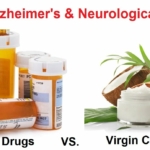Comments by Brian Shilhavy
Editor, Health Impact News
In this video from Specialty Health, you can listen to a panel discussion with five medical doctors, Gary Taubes, and Robb Wolf regarding the problem of insulin resistance and the damaging effects of a high carbohydrate diet on Alzheimer’s Disease, and how coconut oil can be effective in treating Alzheimer’s Disease.
The doctors in the video are:
Dr. James Greenwald, Medical Director of Specialty Health. Dr. James Greenwald is board certified in orthopedic surgery and has over 30 years of experience in the orthopedic field. Early in his career, he specialized in knee, shoulder, ankle, and trauma injuries. He has served as the team physician for the University of Nevada football and baseball teams for many years.
Dr. Gary Anderson, vascular health, board certified, and a member of the American Board of Lipidology. He has worked as a physician in nursing homes for over 35 years. In this video he discusses the problem of “polypharmacy,” the problem of too many drugs being used in nursing homes, as a cause of dementia.
Dr. Peter Attia, is a former McKinsey & Company consultant, surgeon, engineer, calculus teacher and an author of numerous medical and research papers.
Dr. Tara Dall, member of the American Board of Lipidology.
Dr. Malcolm D. Bacchus, a board certified neurologist.
Also appearing:
Gary Taubes, science journalist and author of best-selling books “Good Calories, Bad Calories” and “Why We Get Fat.”
Robb Wolf, author of the best-selling book “The Paleo Solution.”
Dr. Greenwald is the moderator of the panel discussion, so we don’t really hear much from him regarding his views on the problems with insulin and the high carbohydrate diet, or coconut oil, in regards to Alzheimer’s. But since he is the one who organized and moderates the discussion, it’s pretty clear where his views are on these topics (positive).
Dr. Gary Anderson
The discussion starts, appropriately enough, with Dr. Anderson, since he has worked in nursing homes for over 35 years and fought to make meals for the elderly more nutritious, with less refined carbohydrates.
Having seen literally thousands of patients with Alzheimer’s and dementia, Dr. Anderson sees the end result of poor dietary choices as well as the devastating effects of elderly people being on so many drugs, often 30 or more different medications at one time. He sees this as a contributing factor in dementia.
He is currently trying to work with nursing home dietitians and administrators to change their menus and remove a lot of the excess carbohydrates that cause insulin resistance and is a contributing factor in dementia.
He is also working with family members and caregivers to encourage them to incorporate coconut oil into the diet of those suffering from Alzheimer’s. He currently has one relative on coconut oil that is seeing benefits, and he wants to take one wing of the current nursing home he is working at and start supplementing them with two tablespoons of coconut oil (with the family’s permission) a day.
He mentions in the video that the University of Chicago stated that Alzheimer’s and dementia would eventually bankrupt our country back in 1978, and the problem is much worse today, suggesting that the traditional medical approach has failed.
Dr. Peter Attia
Next, Dr. Attia weighs in on the ketonic effect of medium chain fatty acids, in answer to a question as to why coconut oil “works” with Alzheimer’s. Gary Taubes suggests that it is the ketones, and Dr. Attia gives an overview on how medium chain fatty acids work. Dr. Attia does make one slight mistake when he states that medium chain fatty acids are present in abundance in both coconut oil and palm oil.
That is true for coconut oil, but not palm oil. Palm kernel oil, which is different from palm oil, is high in the medium chain triglycerides/fatty acids (MCT). But palm kernel oil is made from the endosperm of the palm oil fruit, not the fruit itself which is used to make palm oil. Palm kernel oil is largely unavailable as a dietary oil.
One interesting comment by Dr. Attia (which Robb Wolf also agreed) regarding his own experience in using MCTs is that the ketogenic effect is often seen with those who continue a high carbohydrate diet.
I have seen this also. In one of our testimonies that we published, the daughter of the parent emailed me about her positive experience, and told me how she was “sneaking” the coconut oil into her parent’s diet. She was using a lot of refined sugar (which we subsequently had a discussion about – and she thanked me), and yet was still seeing positive results.
Gary Taubes
Next, Gary Taubes talked about the principles of the ketogenic diet, and referenced one clinical trial done at the University of Cincinnati that induced ketosis from diet, through carbohydrate restriction, and saw positive results in patients with cognitive impairment. He then discussed the long history (over 70 years) of the ketogenic diet in relation to epilepsy. The ketogenic diet has a history of completely halting seizures in children when drugs do not work.
Curiously, Mr. Taubes put forth the idea that it may not be ketones that work in many of these cases, but simply carb restriction, and he referenced a study at Harvard that supposedly showed this among childhood epilepsy.
Apparently the study used only a low glycemic diet that did not induce ketosis. He then said it could be a similar situation with Alzheimer’s, apparently ignoring Dr. Attia and Robb Wolf’s experiences (and mine as well – although I wasn’t there!) that coconut oil produces these results even on a high carb diet in some situations.
Dr. Tara Dall
Dr. Dall speaks next, and I believe there is a separate video from Specialty Health covering more of her comments. In this section she discusses the cost factor of caring for Alzheimer’s patients, bringing out the point that we have much cheaper alternatives to expensive medical procedures and expensive drugs, that are related to diet and insulin resistance. She doesn’t think that expensive screenings at age 30 are worth it, since it is not dealing with the problem.
Dr. Malcolm D. Bacchus
Dr. Bacchus speaks next, and he apparently is someone who treats a lot of Alzheimer’s patients, especially at late stages. He states that by the time he sees patients with Alzheimer’s, that it is too late, and most drugs are not effective.
He talks about how much of the current research on prevention is centered around costly medical procedures, and I actually reported a story on one of these new procedures that apparently only benefits the medical business, and not the patient (see: New Alzheimer’s Imaging Test Provides NO Benefits, Only Profits for Drug Companies).
He also discusses how medical research for Alzheimer’s is currently looking at genetic patterns that present risk factors, and that there is a plan for developing an Alzheimer’s vaccine (see: Obama Spending Your Tax Dollars to Develop an Alzheimer’s Vaccine in Colombia).
These areas of “prevention” are very speculative with no proven benefits (see: Harvard Medical School To Be Tried for Alzheimer’s Research Fraud) and are very costly.
Robb Wolf
Robb Wolf speaks next and talks about how incredibly costly it is for all of these expensive procedures, with very little efficacy. He states that return on the investment in medical care for Alzheimer’s is horrible, and is bankrupting our country. And yet we have simple low cost dietary solutions that medical institutions and academic centers are unwilling to even try.
Conclusion
This is a great video with some very knowledgeable medical doctors and nutrition experts that are not tied in financially to the pharmaceutical system, and give solid evidence to the low carbohydrate diet and coconut oil for Alzheimer’s and dementia. As the leading publisher of coconut oil news on the Internet, every week I see stories and user forums where medical doctors and other medical professionals are asked about the effects of coconut oil on Alzheimer’s, and their response is almost like a script.
It usually goes something like this: “There is no science or long-term studies done on coconut oil to prove these claims, therefore we cannot recommend it.”
It breaks my heart to think that people caring for loved ones with this tragic disease are unnecessarily being discouraged from even trying something that is so readily available and completely natural with virtually no risk. (See: Alzheimer’s Association Warns Against Coconut Oil – Member Replies “Coconut Oil Gave us our Father Back!”)
The anecdotal evidence is strong, and there is much science regarding the dangerous effects of insulin resistance through a carbohydrate diet, as well as the benefits from ketosis. This video is so refreshing, and so welcome. I hope it is viewed and shared as much as possible.
Please share this with everyone you know who is touched by Alzheimer’s or dementia!
See Also: Coconut Oil and Alzheimer’s: The Low-fat Diet and Cholesterol Lowering Drugs Part of the Problem?
About the author: Unlike many people who write about coconut oil by simply reading about it, Brian Shilhavy actually lived in a coconut producing area of the Philippines for several years with his family, observing firsthand the differences between the diet and health of the younger generation and those of his wife’s parents’ generation still consuming a traditional diet. This led to years of studying Philippine nutrition and dietary patterns first hand while living in a rural farming community in the Philippines. Brian is the author of the best-selling book: Virgin Coconut Oil: How it has changed people’s lives and how it can change yours!
Read the Virgin Coconut Oil eBook on Your Mobile Device!






 HHS Secretary Kennedy Breaks His Promise: "War on Saturated Fat" Kept in Tact with New U.S. Dietary Guidelines
HHS Secretary Kennedy Breaks His Promise: "War on Saturated Fat" Kept in Tact with New U.S. Dietary Guidelines Research Continues to Show Virgin Coconut Oil's Effectiveness in Treating Cancer
Research Continues to Show Virgin Coconut Oil's Effectiveness in Treating Cancer Coconut Oil Continues to Benefit Alzheimer's Patients over Drugs as Studies Continue for Neurological Benefits
Coconut Oil Continues to Benefit Alzheimer's Patients over Drugs as Studies Continue for Neurological Benefits How the Simple High-Fat Low-Carb Ketogenic Diet Continues to Change People's Lives
How the Simple High-Fat Low-Carb Ketogenic Diet Continues to Change People's Lives New Studies Continue to Show that Coconut Oil is the Best Oil for Treating Skin Conditions and Maintaining Healthy Skin and Teeth
New Studies Continue to Show that Coconut Oil is the Best Oil for Treating Skin Conditions and Maintaining Healthy Skin and Teeth